A Comprehensive Report on Organisation Behavior in the BBC Company
VerifiedAdded on 2020/07/23
|13
|4063
|173
Report
AI Summary
This report examines the organizational behavior within the BBC, focusing on key aspects such as organizational culture, motivation techniques, and team dynamics. It begins with an exploration of Handy's cultural typology and its relevance to the BBC, analyzing how culture, power, and policies influence employee behavior. The report then delves into motivation theories, particularly Maslow's hierarchy of needs, and evaluates how motivation techniques can improve team effectiveness within the BBC. It identifies various types of teams within the company and discusses the characteristics of an effective team, including open communication and effective leadership. The report also addresses organizational concept theory and its impact on team performance, and it concludes by identifying the main barriers to effective performance within the BBC. The analysis provides valuable insights into improving employee motivation and team performance within the organization.
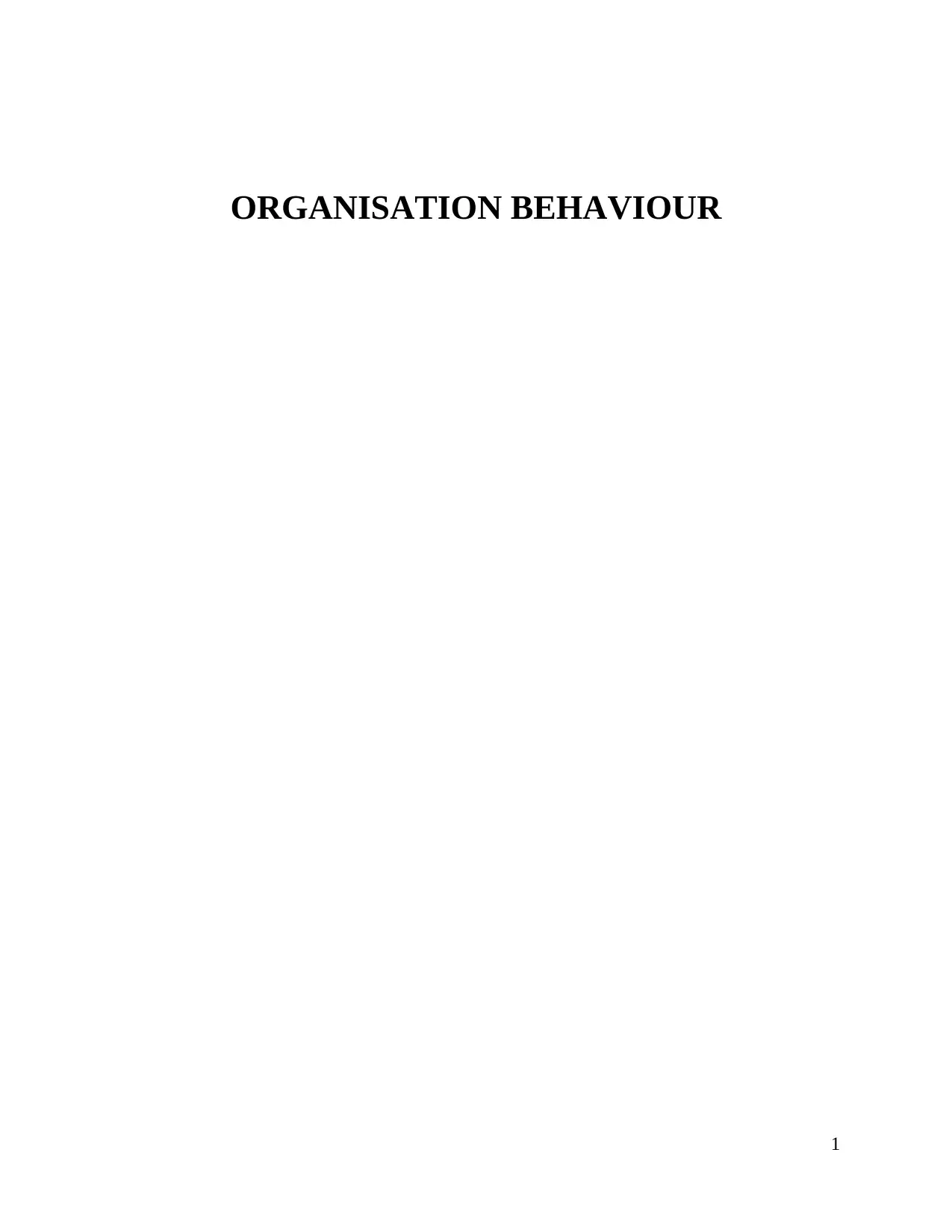
ORGANISATION BEHAVIOUR
1
1
Paraphrase This Document
Need a fresh take? Get an instant paraphrase of this document with our AI Paraphraser
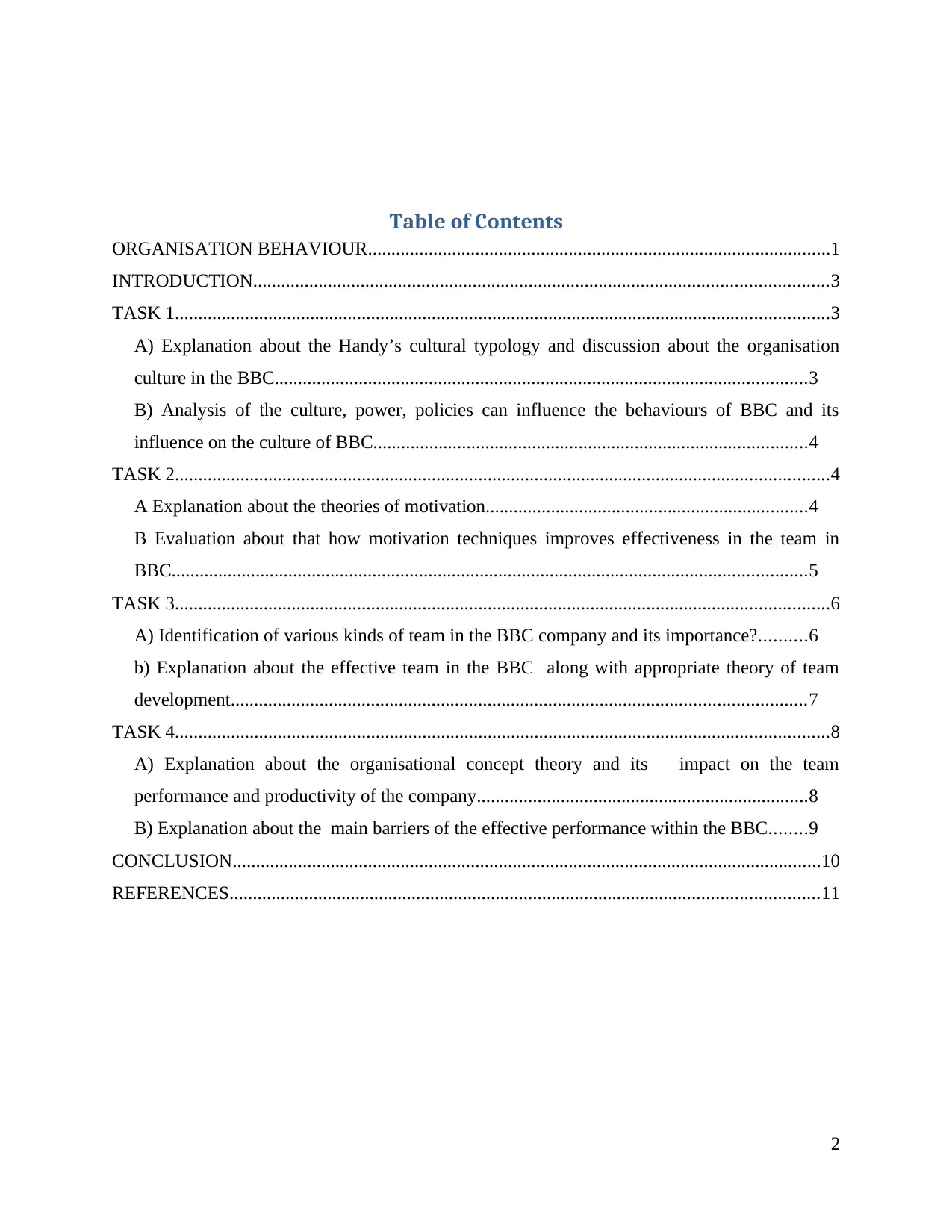
Table of Contents
ORGANISATION BEHAVIOUR...................................................................................................1
INTRODUCTION...........................................................................................................................3
TASK 1............................................................................................................................................3
A) Explanation about the Handy’s cultural typology and discussion about the organisation
culture in the BBC..................................................................................................................3
B) Analysis of the culture, power, policies can influence the behaviours of BBC and its
influence on the culture of BBC.............................................................................................4
TASK 2............................................................................................................................................4
A Explanation about the theories of motivation.....................................................................4
B Evaluation about that how motivation techniques improves effectiveness in the team in
BBC........................................................................................................................................5
TASK 3............................................................................................................................................6
A) Identification of various kinds of team in the BBC company and its importance?..........6
b) Explanation about the effective team in the BBC along with appropriate theory of team
development...........................................................................................................................7
TASK 4............................................................................................................................................8
A) Explanation about the organisational concept theory and its impact on the team
performance and productivity of the company.......................................................................8
B) Explanation about the main barriers of the effective performance within the BBC........9
CONCLUSION..............................................................................................................................10
REFERENCES..............................................................................................................................11
2
ORGANISATION BEHAVIOUR...................................................................................................1
INTRODUCTION...........................................................................................................................3
TASK 1............................................................................................................................................3
A) Explanation about the Handy’s cultural typology and discussion about the organisation
culture in the BBC..................................................................................................................3
B) Analysis of the culture, power, policies can influence the behaviours of BBC and its
influence on the culture of BBC.............................................................................................4
TASK 2............................................................................................................................................4
A Explanation about the theories of motivation.....................................................................4
B Evaluation about that how motivation techniques improves effectiveness in the team in
BBC........................................................................................................................................5
TASK 3............................................................................................................................................6
A) Identification of various kinds of team in the BBC company and its importance?..........6
b) Explanation about the effective team in the BBC along with appropriate theory of team
development...........................................................................................................................7
TASK 4............................................................................................................................................8
A) Explanation about the organisational concept theory and its impact on the team
performance and productivity of the company.......................................................................8
B) Explanation about the main barriers of the effective performance within the BBC........9
CONCLUSION..............................................................................................................................10
REFERENCES..............................................................................................................................11
2
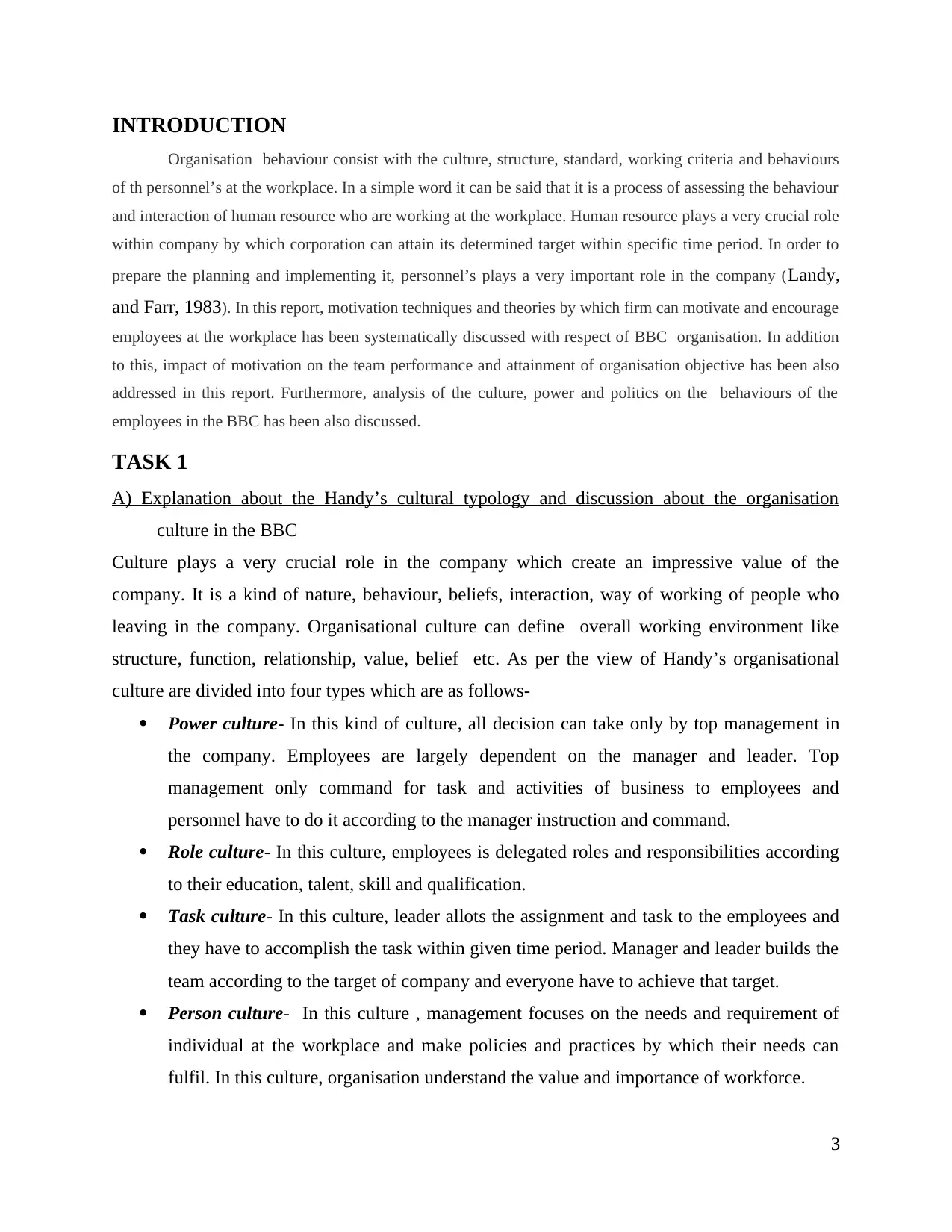
INTRODUCTION
Organisation behaviour consist with the culture, structure, standard, working criteria and behaviours
of th personnel’s at the workplace. In a simple word it can be said that it is a process of assessing the behaviour
and interaction of human resource who are working at the workplace. Human resource plays a very crucial role
within company by which corporation can attain its determined target within specific time period. In order to
prepare the planning and implementing it, personnel’s plays a very important role in the company (Landy,
and Farr, 1983). In this report, motivation techniques and theories by which firm can motivate and encourage
employees at the workplace has been systematically discussed with respect of BBC organisation. In addition
to this, impact of motivation on the team performance and attainment of organisation objective has been also
addressed in this report. Furthermore, analysis of the culture, power and politics on the behaviours of the
employees in the BBC has been also discussed.
TASK 1
A) Explanation about the Handy’s cultural typology and discussion about the organisation
culture in the BBC
Culture plays a very crucial role in the company which create an impressive value of the
company. It is a kind of nature, behaviour, beliefs, interaction, way of working of people who
leaving in the company. Organisational culture can define overall working environment like
structure, function, relationship, value, belief etc. As per the view of Handy’s organisational
culture are divided into four types which are as follows-
Power culture- In this kind of culture, all decision can take only by top management in
the company. Employees are largely dependent on the manager and leader. Top
management only command for task and activities of business to employees and
personnel have to do it according to the manager instruction and command.
Role culture- In this culture, employees is delegated roles and responsibilities according
to their education, talent, skill and qualification.
Task culture- In this culture, leader allots the assignment and task to the employees and
they have to accomplish the task within given time period. Manager and leader builds the
team according to the target of company and everyone have to achieve that target.
Person culture- In this culture , management focuses on the needs and requirement of
individual at the workplace and make policies and practices by which their needs can
fulfil. In this culture, organisation understand the value and importance of workforce.
3
Organisation behaviour consist with the culture, structure, standard, working criteria and behaviours
of th personnel’s at the workplace. In a simple word it can be said that it is a process of assessing the behaviour
and interaction of human resource who are working at the workplace. Human resource plays a very crucial role
within company by which corporation can attain its determined target within specific time period. In order to
prepare the planning and implementing it, personnel’s plays a very important role in the company (Landy,
and Farr, 1983). In this report, motivation techniques and theories by which firm can motivate and encourage
employees at the workplace has been systematically discussed with respect of BBC organisation. In addition
to this, impact of motivation on the team performance and attainment of organisation objective has been also
addressed in this report. Furthermore, analysis of the culture, power and politics on the behaviours of the
employees in the BBC has been also discussed.
TASK 1
A) Explanation about the Handy’s cultural typology and discussion about the organisation
culture in the BBC
Culture plays a very crucial role in the company which create an impressive value of the
company. It is a kind of nature, behaviour, beliefs, interaction, way of working of people who
leaving in the company. Organisational culture can define overall working environment like
structure, function, relationship, value, belief etc. As per the view of Handy’s organisational
culture are divided into four types which are as follows-
Power culture- In this kind of culture, all decision can take only by top management in
the company. Employees are largely dependent on the manager and leader. Top
management only command for task and activities of business to employees and
personnel have to do it according to the manager instruction and command.
Role culture- In this culture, employees is delegated roles and responsibilities according
to their education, talent, skill and qualification.
Task culture- In this culture, leader allots the assignment and task to the employees and
they have to accomplish the task within given time period. Manager and leader builds the
team according to the target of company and everyone have to achieve that target.
Person culture- In this culture , management focuses on the needs and requirement of
individual at the workplace and make policies and practices by which their needs can
fulfil. In this culture, organisation understand the value and importance of workforce.
3
⊘ This is a preview!⊘
Do you want full access?
Subscribe today to unlock all pages.

Trusted by 1+ million students worldwide
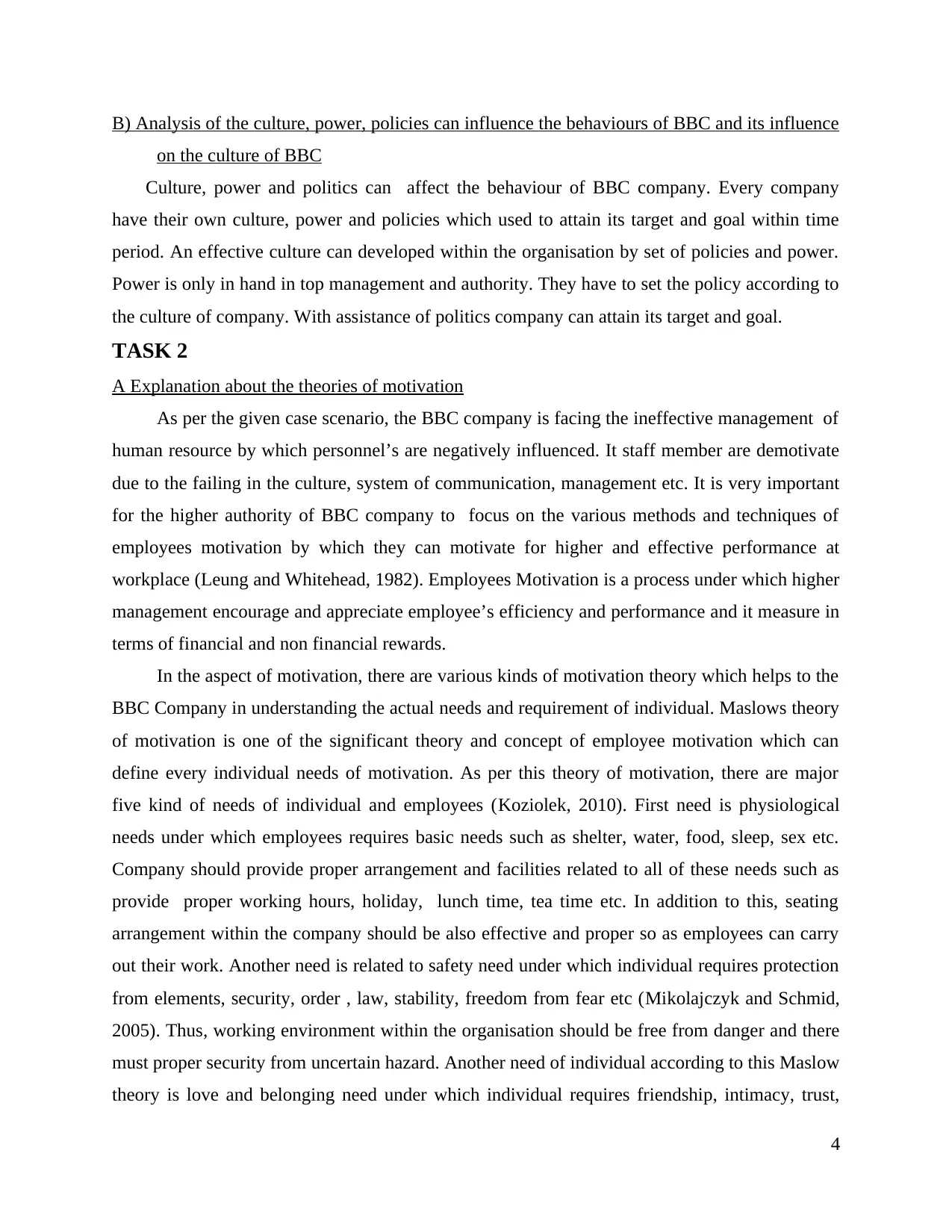
B) Analysis of the culture, power, policies can influence the behaviours of BBC and its influence
on the culture of BBC
Culture, power and politics can affect the behaviour of BBC company. Every company
have their own culture, power and policies which used to attain its target and goal within time
period. An effective culture can developed within the organisation by set of policies and power.
Power is only in hand in top management and authority. They have to set the policy according to
the culture of company. With assistance of politics company can attain its target and goal.
TASK 2
A Explanation about the theories of motivation
As per the given case scenario, the BBC company is facing the ineffective management of
human resource by which personnel’s are negatively influenced. It staff member are demotivate
due to the failing in the culture, system of communication, management etc. It is very important
for the higher authority of BBC company to focus on the various methods and techniques of
employees motivation by which they can motivate for higher and effective performance at
workplace (Leung and Whitehead, 1982). Employees Motivation is a process under which higher
management encourage and appreciate employee’s efficiency and performance and it measure in
terms of financial and non financial rewards.
In the aspect of motivation, there are various kinds of motivation theory which helps to the
BBC Company in understanding the actual needs and requirement of individual. Maslows theory
of motivation is one of the significant theory and concept of employee motivation which can
define every individual needs of motivation. As per this theory of motivation, there are major
five kind of needs of individual and employees (Koziolek, 2010). First need is physiological
needs under which employees requires basic needs such as shelter, water, food, sleep, sex etc.
Company should provide proper arrangement and facilities related to all of these needs such as
provide proper working hours, holiday, lunch time, tea time etc. In addition to this, seating
arrangement within the company should be also effective and proper so as employees can carry
out their work. Another need is related to safety need under which individual requires protection
from elements, security, order , law, stability, freedom from fear etc (Mikolajczyk and Schmid,
2005). Thus, working environment within the organisation should be free from danger and there
must proper security from uncertain hazard. Another need of individual according to this Maslow
theory is love and belonging need under which individual requires friendship, intimacy, trust,
4
on the culture of BBC
Culture, power and politics can affect the behaviour of BBC company. Every company
have their own culture, power and policies which used to attain its target and goal within time
period. An effective culture can developed within the organisation by set of policies and power.
Power is only in hand in top management and authority. They have to set the policy according to
the culture of company. With assistance of politics company can attain its target and goal.
TASK 2
A Explanation about the theories of motivation
As per the given case scenario, the BBC company is facing the ineffective management of
human resource by which personnel’s are negatively influenced. It staff member are demotivate
due to the failing in the culture, system of communication, management etc. It is very important
for the higher authority of BBC company to focus on the various methods and techniques of
employees motivation by which they can motivate for higher and effective performance at
workplace (Leung and Whitehead, 1982). Employees Motivation is a process under which higher
management encourage and appreciate employee’s efficiency and performance and it measure in
terms of financial and non financial rewards.
In the aspect of motivation, there are various kinds of motivation theory which helps to the
BBC Company in understanding the actual needs and requirement of individual. Maslows theory
of motivation is one of the significant theory and concept of employee motivation which can
define every individual needs of motivation. As per this theory of motivation, there are major
five kind of needs of individual and employees (Koziolek, 2010). First need is physiological
needs under which employees requires basic needs such as shelter, water, food, sleep, sex etc.
Company should provide proper arrangement and facilities related to all of these needs such as
provide proper working hours, holiday, lunch time, tea time etc. In addition to this, seating
arrangement within the company should be also effective and proper so as employees can carry
out their work. Another need is related to safety need under which individual requires protection
from elements, security, order , law, stability, freedom from fear etc (Mikolajczyk and Schmid,
2005). Thus, working environment within the organisation should be free from danger and there
must proper security from uncertain hazard. Another need of individual according to this Maslow
theory is love and belonging need under which individual requires friendship, intimacy, trust,
4
Paraphrase This Document
Need a fresh take? Get an instant paraphrase of this document with our AI Paraphraser
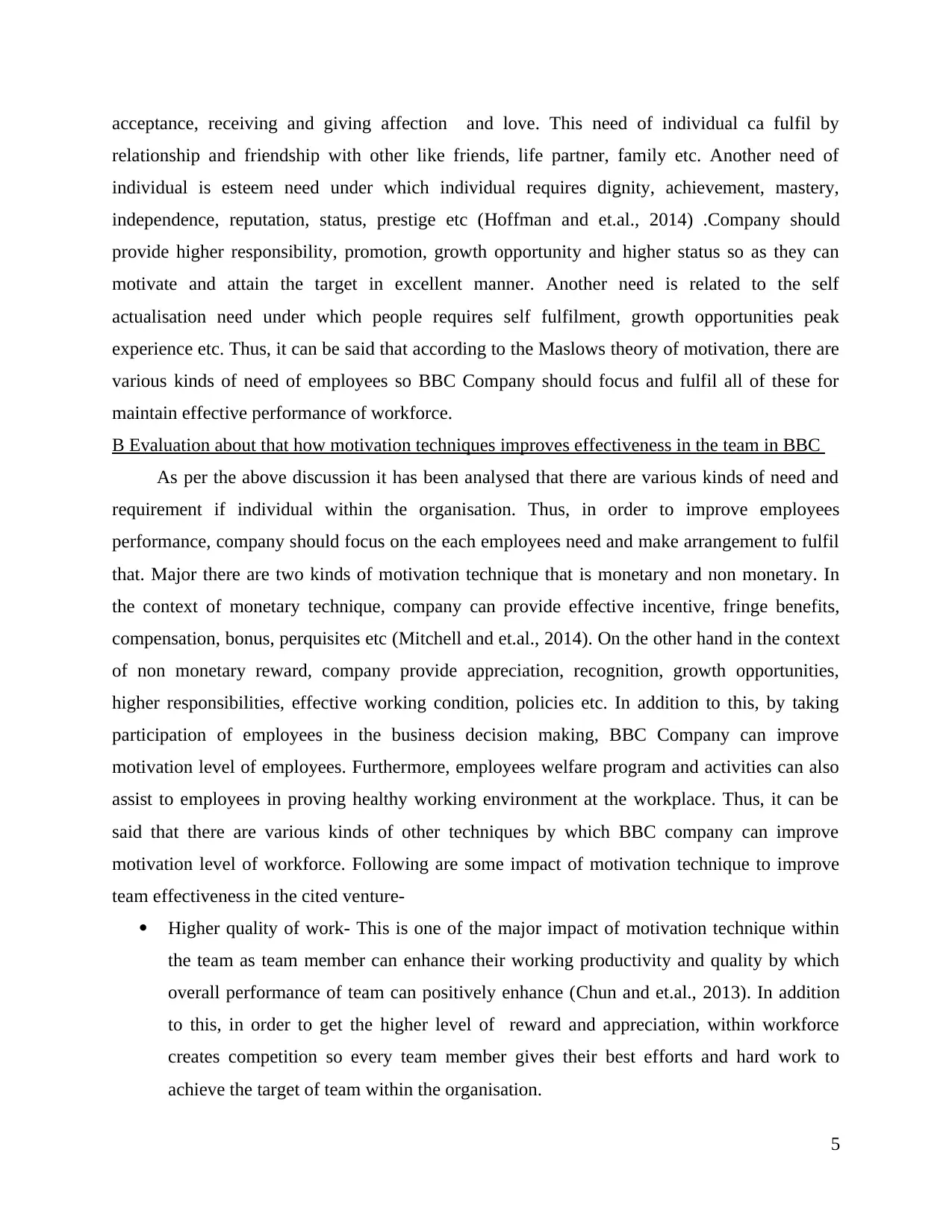
acceptance, receiving and giving affection and love. This need of individual ca fulfil by
relationship and friendship with other like friends, life partner, family etc. Another need of
individual is esteem need under which individual requires dignity, achievement, mastery,
independence, reputation, status, prestige etc (Hoffman and et.al., 2014) .Company should
provide higher responsibility, promotion, growth opportunity and higher status so as they can
motivate and attain the target in excellent manner. Another need is related to the self
actualisation need under which people requires self fulfilment, growth opportunities peak
experience etc. Thus, it can be said that according to the Maslows theory of motivation, there are
various kinds of need of employees so BBC Company should focus and fulfil all of these for
maintain effective performance of workforce.
B Evaluation about that how motivation techniques improves effectiveness in the team in BBC
As per the above discussion it has been analysed that there are various kinds of need and
requirement if individual within the organisation. Thus, in order to improve employees
performance, company should focus on the each employees need and make arrangement to fulfil
that. Major there are two kinds of motivation technique that is monetary and non monetary. In
the context of monetary technique, company can provide effective incentive, fringe benefits,
compensation, bonus, perquisites etc (Mitchell and et.al., 2014). On the other hand in the context
of non monetary reward, company provide appreciation, recognition, growth opportunities,
higher responsibilities, effective working condition, policies etc. In addition to this, by taking
participation of employees in the business decision making, BBC Company can improve
motivation level of employees. Furthermore, employees welfare program and activities can also
assist to employees in proving healthy working environment at the workplace. Thus, it can be
said that there are various kinds of other techniques by which BBC company can improve
motivation level of workforce. Following are some impact of motivation technique to improve
team effectiveness in the cited venture-
Higher quality of work- This is one of the major impact of motivation technique within
the team as team member can enhance their working productivity and quality by which
overall performance of team can positively enhance (Chun and et.al., 2013). In addition
to this, in order to get the higher level of reward and appreciation, within workforce
creates competition so every team member gives their best efforts and hard work to
achieve the target of team within the organisation.
5
relationship and friendship with other like friends, life partner, family etc. Another need of
individual is esteem need under which individual requires dignity, achievement, mastery,
independence, reputation, status, prestige etc (Hoffman and et.al., 2014) .Company should
provide higher responsibility, promotion, growth opportunity and higher status so as they can
motivate and attain the target in excellent manner. Another need is related to the self
actualisation need under which people requires self fulfilment, growth opportunities peak
experience etc. Thus, it can be said that according to the Maslows theory of motivation, there are
various kinds of need of employees so BBC Company should focus and fulfil all of these for
maintain effective performance of workforce.
B Evaluation about that how motivation techniques improves effectiveness in the team in BBC
As per the above discussion it has been analysed that there are various kinds of need and
requirement if individual within the organisation. Thus, in order to improve employees
performance, company should focus on the each employees need and make arrangement to fulfil
that. Major there are two kinds of motivation technique that is monetary and non monetary. In
the context of monetary technique, company can provide effective incentive, fringe benefits,
compensation, bonus, perquisites etc (Mitchell and et.al., 2014). On the other hand in the context
of non monetary reward, company provide appreciation, recognition, growth opportunities,
higher responsibilities, effective working condition, policies etc. In addition to this, by taking
participation of employees in the business decision making, BBC Company can improve
motivation level of employees. Furthermore, employees welfare program and activities can also
assist to employees in proving healthy working environment at the workplace. Thus, it can be
said that there are various kinds of other techniques by which BBC company can improve
motivation level of workforce. Following are some impact of motivation technique to improve
team effectiveness in the cited venture-
Higher quality of work- This is one of the major impact of motivation technique within
the team as team member can enhance their working productivity and quality by which
overall performance of team can positively enhance (Chun and et.al., 2013). In addition
to this, in order to get the higher level of reward and appreciation, within workforce
creates competition so every team member gives their best efforts and hard work to
achieve the target of team within the organisation.
5
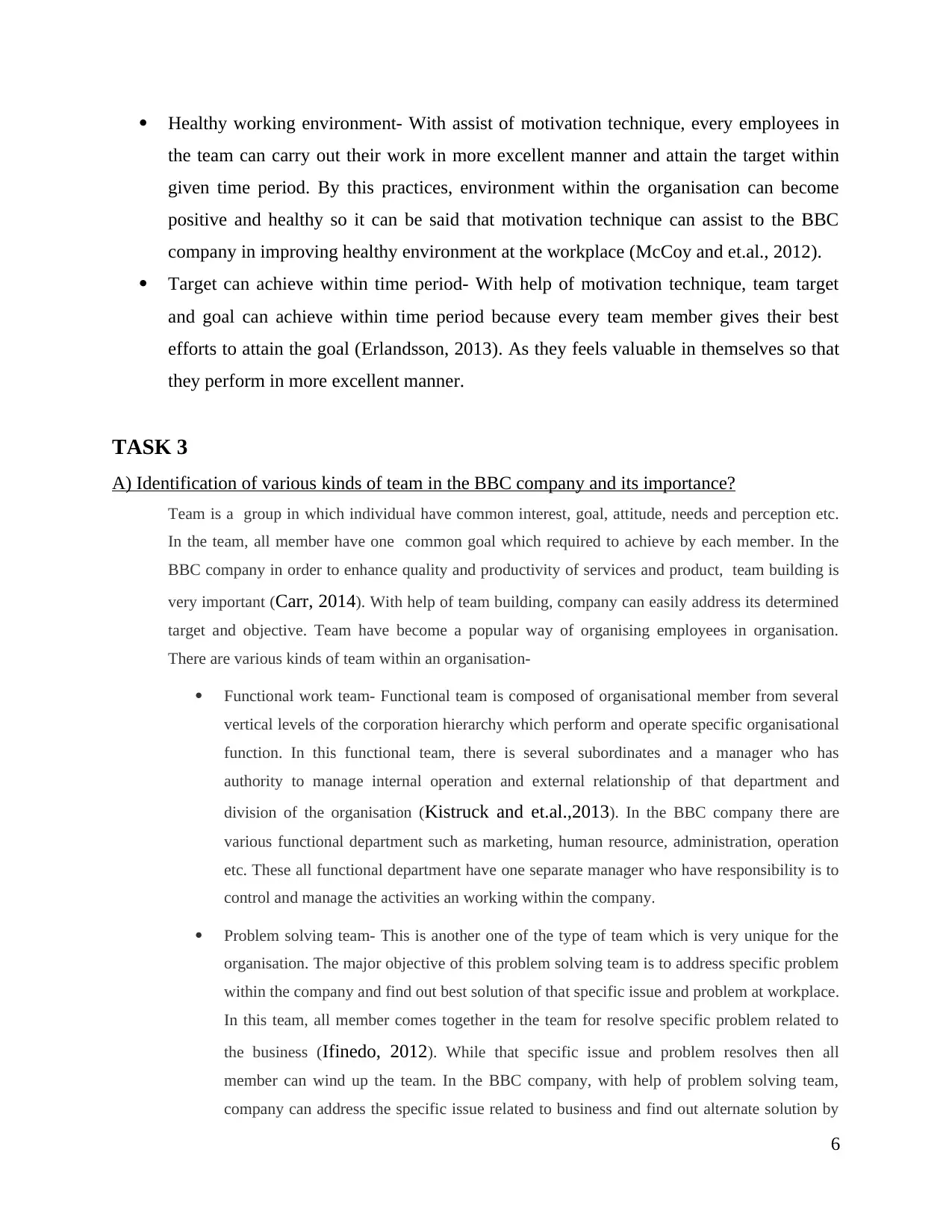
Healthy working environment- With assist of motivation technique, every employees in
the team can carry out their work in more excellent manner and attain the target within
given time period. By this practices, environment within the organisation can become
positive and healthy so it can be said that motivation technique can assist to the BBC
company in improving healthy environment at the workplace (McCoy and et.al., 2012).
Target can achieve within time period- With help of motivation technique, team target
and goal can achieve within time period because every team member gives their best
efforts to attain the goal (Erlandsson, 2013). As they feels valuable in themselves so that
they perform in more excellent manner.
TASK 3
A) Identification of various kinds of team in the BBC company and its importance?
Team is a group in which individual have common interest, goal, attitude, needs and perception etc.
In the team, all member have one common goal which required to achieve by each member. In the
BBC company in order to enhance quality and productivity of services and product, team building is
very important (Carr, 2014). With help of team building, company can easily address its determined
target and objective. Team have become a popular way of organising employees in organisation.
There are various kinds of team within an organisation-
Functional work team- Functional team is composed of organisational member from several
vertical levels of the corporation hierarchy which perform and operate specific organisational
function. In this functional team, there is several subordinates and a manager who has
authority to manage internal operation and external relationship of that department and
division of the organisation (Kistruck and et.al.,2013). In the BBC company there are
various functional department such as marketing, human resource, administration, operation
etc. These all functional department have one separate manager who have responsibility is to
control and manage the activities an working within the company.
Problem solving team- This is another one of the type of team which is very unique for the
organisation. The major objective of this problem solving team is to address specific problem
within the company and find out best solution of that specific issue and problem at workplace.
In this team, all member comes together in the team for resolve specific problem related to
the business (Ifinedo, 2012). While that specific issue and problem resolves then all
member can wind up the team. In the BBC company, with help of problem solving team,
company can address the specific issue related to business and find out alternate solution by
6
the team can carry out their work in more excellent manner and attain the target within
given time period. By this practices, environment within the organisation can become
positive and healthy so it can be said that motivation technique can assist to the BBC
company in improving healthy environment at the workplace (McCoy and et.al., 2012).
Target can achieve within time period- With help of motivation technique, team target
and goal can achieve within time period because every team member gives their best
efforts to attain the goal (Erlandsson, 2013). As they feels valuable in themselves so that
they perform in more excellent manner.
TASK 3
A) Identification of various kinds of team in the BBC company and its importance?
Team is a group in which individual have common interest, goal, attitude, needs and perception etc.
In the team, all member have one common goal which required to achieve by each member. In the
BBC company in order to enhance quality and productivity of services and product, team building is
very important (Carr, 2014). With help of team building, company can easily address its determined
target and objective. Team have become a popular way of organising employees in organisation.
There are various kinds of team within an organisation-
Functional work team- Functional team is composed of organisational member from several
vertical levels of the corporation hierarchy which perform and operate specific organisational
function. In this functional team, there is several subordinates and a manager who has
authority to manage internal operation and external relationship of that department and
division of the organisation (Kistruck and et.al.,2013). In the BBC company there are
various functional department such as marketing, human resource, administration, operation
etc. These all functional department have one separate manager who have responsibility is to
control and manage the activities an working within the company.
Problem solving team- This is another one of the type of team which is very unique for the
organisation. The major objective of this problem solving team is to address specific problem
within the company and find out best solution of that specific issue and problem at workplace.
In this team, all member comes together in the team for resolve specific problem related to
the business (Ifinedo, 2012). While that specific issue and problem resolves then all
member can wind up the team. In the BBC company, with help of problem solving team,
company can address the specific issue related to business and find out alternate solution by
6
⊘ This is a preview!⊘
Do you want full access?
Subscribe today to unlock all pages.

Trusted by 1+ million students worldwide
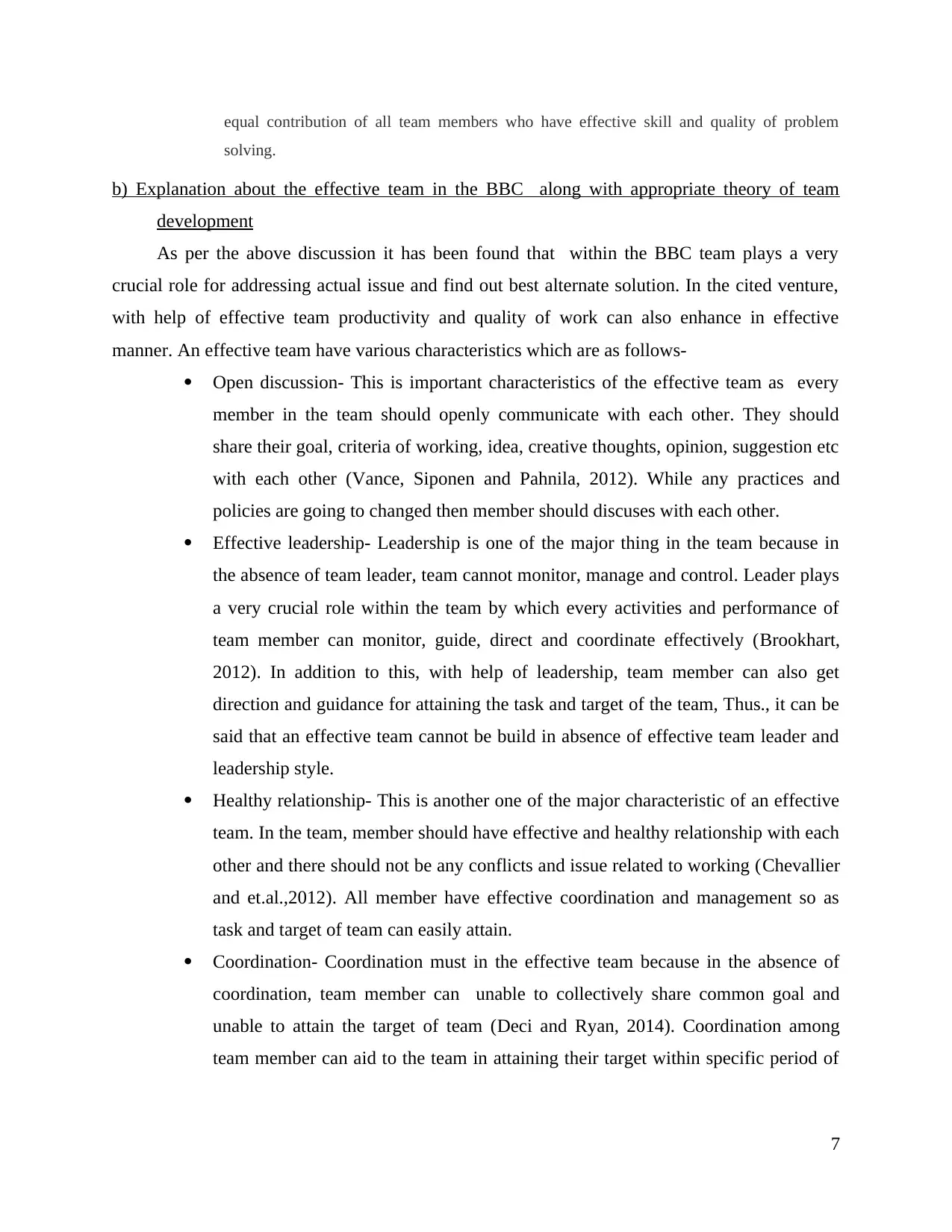
equal contribution of all team members who have effective skill and quality of problem
solving.
b) Explanation about the effective team in the BBC along with appropriate theory of team
development
As per the above discussion it has been found that within the BBC team plays a very
crucial role for addressing actual issue and find out best alternate solution. In the cited venture,
with help of effective team productivity and quality of work can also enhance in effective
manner. An effective team have various characteristics which are as follows-
Open discussion- This is important characteristics of the effective team as every
member in the team should openly communicate with each other. They should
share their goal, criteria of working, idea, creative thoughts, opinion, suggestion etc
with each other (Vance, Siponen and Pahnila, 2012). While any practices and
policies are going to changed then member should discuses with each other.
Effective leadership- Leadership is one of the major thing in the team because in
the absence of team leader, team cannot monitor, manage and control. Leader plays
a very crucial role within the team by which every activities and performance of
team member can monitor, guide, direct and coordinate effectively (Brookhart,
2012). In addition to this, with help of leadership, team member can also get
direction and guidance for attaining the task and target of the team, Thus., it can be
said that an effective team cannot be build in absence of effective team leader and
leadership style.
Healthy relationship- This is another one of the major characteristic of an effective
team. In the team, member should have effective and healthy relationship with each
other and there should not be any conflicts and issue related to working (Chevallier
and et.al.,2012). All member have effective coordination and management so as
task and target of team can easily attain.
Coordination- Coordination must in the effective team because in the absence of
coordination, team member can unable to collectively share common goal and
unable to attain the target of team (Deci and Ryan, 2014). Coordination among
team member can aid to the team in attaining their target within specific period of
7
solving.
b) Explanation about the effective team in the BBC along with appropriate theory of team
development
As per the above discussion it has been found that within the BBC team plays a very
crucial role for addressing actual issue and find out best alternate solution. In the cited venture,
with help of effective team productivity and quality of work can also enhance in effective
manner. An effective team have various characteristics which are as follows-
Open discussion- This is important characteristics of the effective team as every
member in the team should openly communicate with each other. They should
share their goal, criteria of working, idea, creative thoughts, opinion, suggestion etc
with each other (Vance, Siponen and Pahnila, 2012). While any practices and
policies are going to changed then member should discuses with each other.
Effective leadership- Leadership is one of the major thing in the team because in
the absence of team leader, team cannot monitor, manage and control. Leader plays
a very crucial role within the team by which every activities and performance of
team member can monitor, guide, direct and coordinate effectively (Brookhart,
2012). In addition to this, with help of leadership, team member can also get
direction and guidance for attaining the task and target of the team, Thus., it can be
said that an effective team cannot be build in absence of effective team leader and
leadership style.
Healthy relationship- This is another one of the major characteristic of an effective
team. In the team, member should have effective and healthy relationship with each
other and there should not be any conflicts and issue related to working (Chevallier
and et.al.,2012). All member have effective coordination and management so as
task and target of team can easily attain.
Coordination- Coordination must in the effective team because in the absence of
coordination, team member can unable to collectively share common goal and
unable to attain the target of team (Deci and Ryan, 2014). Coordination among
team member can aid to the team in attaining their target within specific period of
7
Paraphrase This Document
Need a fresh take? Get an instant paraphrase of this document with our AI Paraphraser
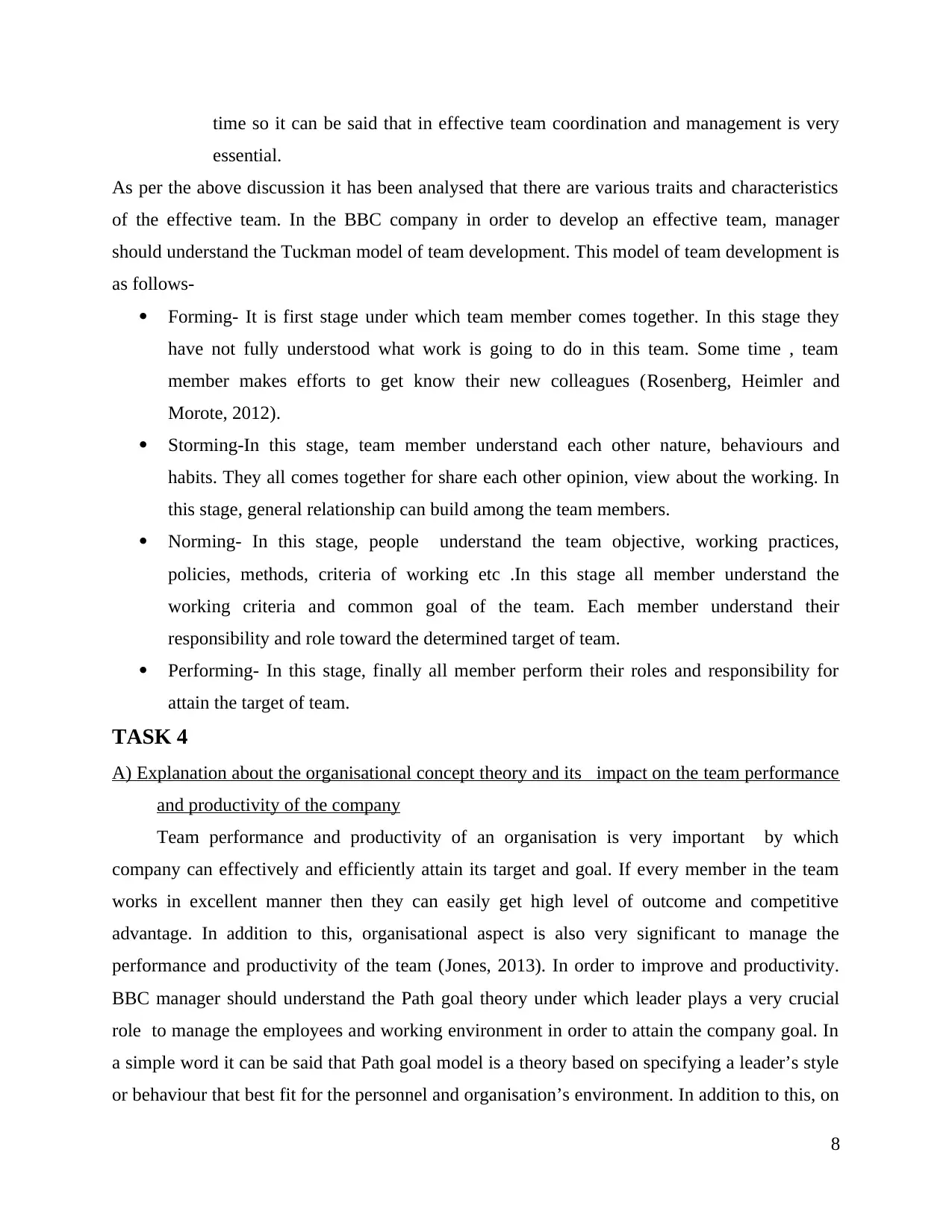
time so it can be said that in effective team coordination and management is very
essential.
As per the above discussion it has been analysed that there are various traits and characteristics
of the effective team. In the BBC company in order to develop an effective team, manager
should understand the Tuckman model of team development. This model of team development is
as follows-
Forming- It is first stage under which team member comes together. In this stage they
have not fully understood what work is going to do in this team. Some time , team
member makes efforts to get know their new colleagues (Rosenberg, Heimler and
Morote, 2012).
Storming-In this stage, team member understand each other nature, behaviours and
habits. They all comes together for share each other opinion, view about the working. In
this stage, general relationship can build among the team members.
Norming- In this stage, people understand the team objective, working practices,
policies, methods, criteria of working etc .In this stage all member understand the
working criteria and common goal of the team. Each member understand their
responsibility and role toward the determined target of team.
Performing- In this stage, finally all member perform their roles and responsibility for
attain the target of team.
TASK 4
A) Explanation about the organisational concept theory and its impact on the team performance
and productivity of the company
Team performance and productivity of an organisation is very important by which
company can effectively and efficiently attain its target and goal. If every member in the team
works in excellent manner then they can easily get high level of outcome and competitive
advantage. In addition to this, organisational aspect is also very significant to manage the
performance and productivity of the team (Jones, 2013). In order to improve and productivity.
BBC manager should understand the Path goal theory under which leader plays a very crucial
role to manage the employees and working environment in order to attain the company goal. In
a simple word it can be said that Path goal model is a theory based on specifying a leader’s style
or behaviour that best fit for the personnel and organisation’s environment. In addition to this, on
8
essential.
As per the above discussion it has been analysed that there are various traits and characteristics
of the effective team. In the BBC company in order to develop an effective team, manager
should understand the Tuckman model of team development. This model of team development is
as follows-
Forming- It is first stage under which team member comes together. In this stage they
have not fully understood what work is going to do in this team. Some time , team
member makes efforts to get know their new colleagues (Rosenberg, Heimler and
Morote, 2012).
Storming-In this stage, team member understand each other nature, behaviours and
habits. They all comes together for share each other opinion, view about the working. In
this stage, general relationship can build among the team members.
Norming- In this stage, people understand the team objective, working practices,
policies, methods, criteria of working etc .In this stage all member understand the
working criteria and common goal of the team. Each member understand their
responsibility and role toward the determined target of team.
Performing- In this stage, finally all member perform their roles and responsibility for
attain the target of team.
TASK 4
A) Explanation about the organisational concept theory and its impact on the team performance
and productivity of the company
Team performance and productivity of an organisation is very important by which
company can effectively and efficiently attain its target and goal. If every member in the team
works in excellent manner then they can easily get high level of outcome and competitive
advantage. In addition to this, organisational aspect is also very significant to manage the
performance and productivity of the team (Jones, 2013). In order to improve and productivity.
BBC manager should understand the Path goal theory under which leader plays a very crucial
role to manage the employees and working environment in order to attain the company goal. In
a simple word it can be said that Path goal model is a theory based on specifying a leader’s style
or behaviour that best fit for the personnel and organisation’s environment. In addition to this, on
8
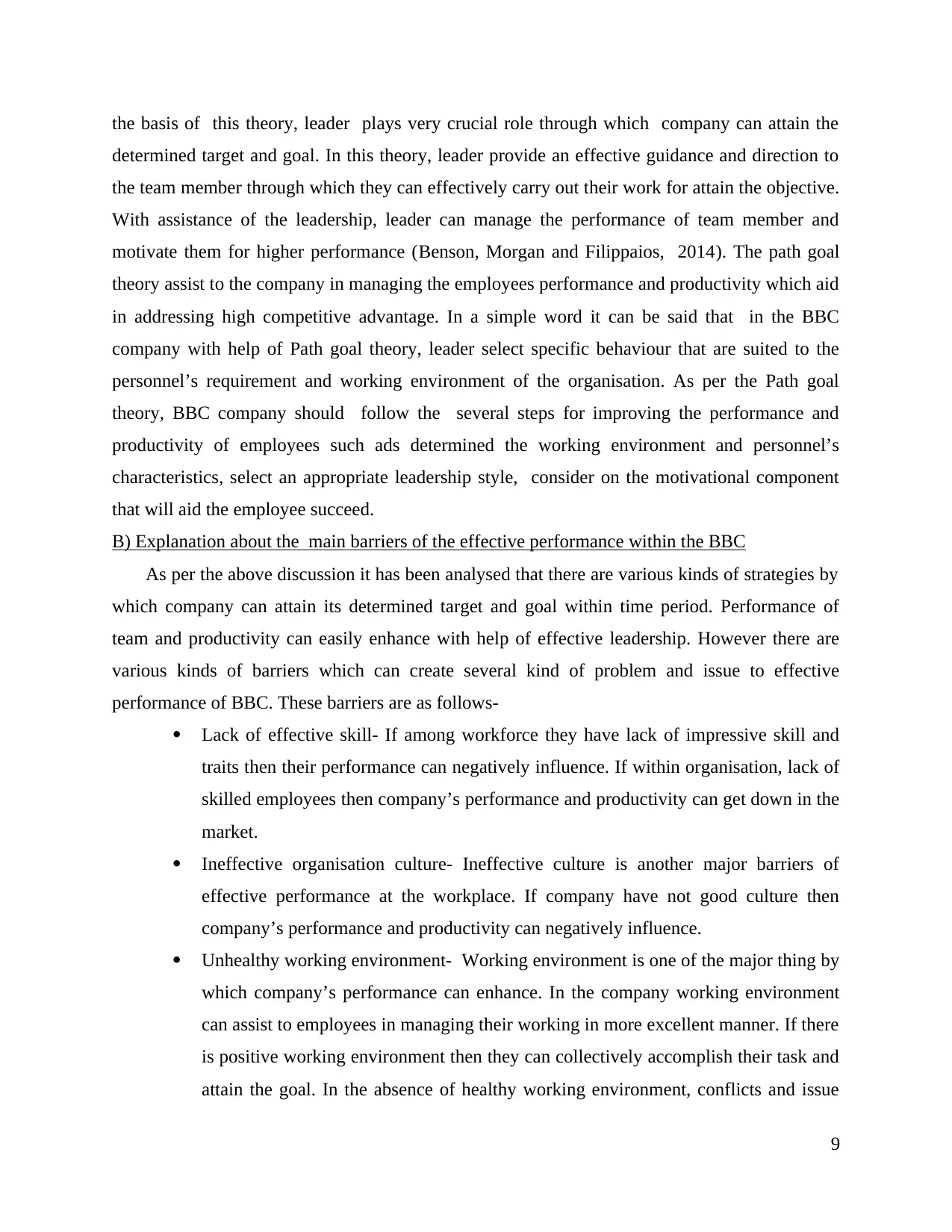
the basis of this theory, leader plays very crucial role through which company can attain the
determined target and goal. In this theory, leader provide an effective guidance and direction to
the team member through which they can effectively carry out their work for attain the objective.
With assistance of the leadership, leader can manage the performance of team member and
motivate them for higher performance (Benson, Morgan and Filippaios, 2014). The path goal
theory assist to the company in managing the employees performance and productivity which aid
in addressing high competitive advantage. In a simple word it can be said that in the BBC
company with help of Path goal theory, leader select specific behaviour that are suited to the
personnel’s requirement and working environment of the organisation. As per the Path goal
theory, BBC company should follow the several steps for improving the performance and
productivity of employees such ads determined the working environment and personnel’s
characteristics, select an appropriate leadership style, consider on the motivational component
that will aid the employee succeed.
B) Explanation about the main barriers of the effective performance within the BBC
As per the above discussion it has been analysed that there are various kinds of strategies by
which company can attain its determined target and goal within time period. Performance of
team and productivity can easily enhance with help of effective leadership. However there are
various kinds of barriers which can create several kind of problem and issue to effective
performance of BBC. These barriers are as follows-
Lack of effective skill- If among workforce they have lack of impressive skill and
traits then their performance can negatively influence. If within organisation, lack of
skilled employees then company’s performance and productivity can get down in the
market.
Ineffective organisation culture- Ineffective culture is another major barriers of
effective performance at the workplace. If company have not good culture then
company’s performance and productivity can negatively influence.
Unhealthy working environment- Working environment is one of the major thing by
which company’s performance can enhance. In the company working environment
can assist to employees in managing their working in more excellent manner. If there
is positive working environment then they can collectively accomplish their task and
attain the goal. In the absence of healthy working environment, conflicts and issue
9
determined target and goal. In this theory, leader provide an effective guidance and direction to
the team member through which they can effectively carry out their work for attain the objective.
With assistance of the leadership, leader can manage the performance of team member and
motivate them for higher performance (Benson, Morgan and Filippaios, 2014). The path goal
theory assist to the company in managing the employees performance and productivity which aid
in addressing high competitive advantage. In a simple word it can be said that in the BBC
company with help of Path goal theory, leader select specific behaviour that are suited to the
personnel’s requirement and working environment of the organisation. As per the Path goal
theory, BBC company should follow the several steps for improving the performance and
productivity of employees such ads determined the working environment and personnel’s
characteristics, select an appropriate leadership style, consider on the motivational component
that will aid the employee succeed.
B) Explanation about the main barriers of the effective performance within the BBC
As per the above discussion it has been analysed that there are various kinds of strategies by
which company can attain its determined target and goal within time period. Performance of
team and productivity can easily enhance with help of effective leadership. However there are
various kinds of barriers which can create several kind of problem and issue to effective
performance of BBC. These barriers are as follows-
Lack of effective skill- If among workforce they have lack of impressive skill and
traits then their performance can negatively influence. If within organisation, lack of
skilled employees then company’s performance and productivity can get down in the
market.
Ineffective organisation culture- Ineffective culture is another major barriers of
effective performance at the workplace. If company have not good culture then
company’s performance and productivity can negatively influence.
Unhealthy working environment- Working environment is one of the major thing by
which company’s performance can enhance. In the company working environment
can assist to employees in managing their working in more excellent manner. If there
is positive working environment then they can collectively accomplish their task and
attain the goal. In the absence of healthy working environment, conflicts and issue
9
⊘ This is a preview!⊘
Do you want full access?
Subscribe today to unlock all pages.

Trusted by 1+ million students worldwide
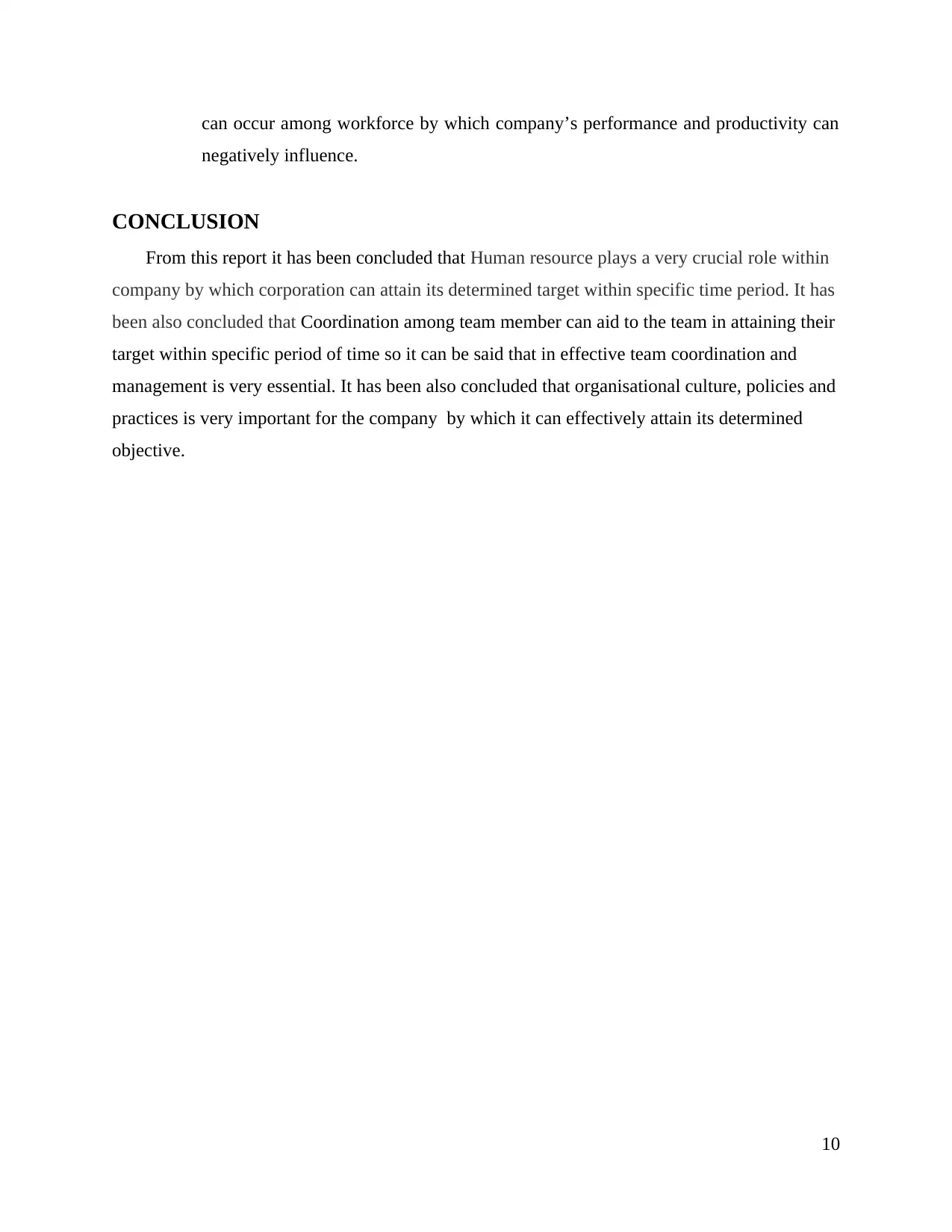
can occur among workforce by which company’s performance and productivity can
negatively influence.
CONCLUSION
From this report it has been concluded that Human resource plays a very crucial role within
company by which corporation can attain its determined target within specific time period. It has
been also concluded that Coordination among team member can aid to the team in attaining their
target within specific period of time so it can be said that in effective team coordination and
management is very essential. It has been also concluded that organisational culture, policies and
practices is very important for the company by which it can effectively attain its determined
objective.
10
negatively influence.
CONCLUSION
From this report it has been concluded that Human resource plays a very crucial role within
company by which corporation can attain its determined target within specific time period. It has
been also concluded that Coordination among team member can aid to the team in attaining their
target within specific period of time so it can be said that in effective team coordination and
management is very essential. It has been also concluded that organisational culture, policies and
practices is very important for the company by which it can effectively attain its determined
objective.
10
Paraphrase This Document
Need a fresh take? Get an instant paraphrase of this document with our AI Paraphraser
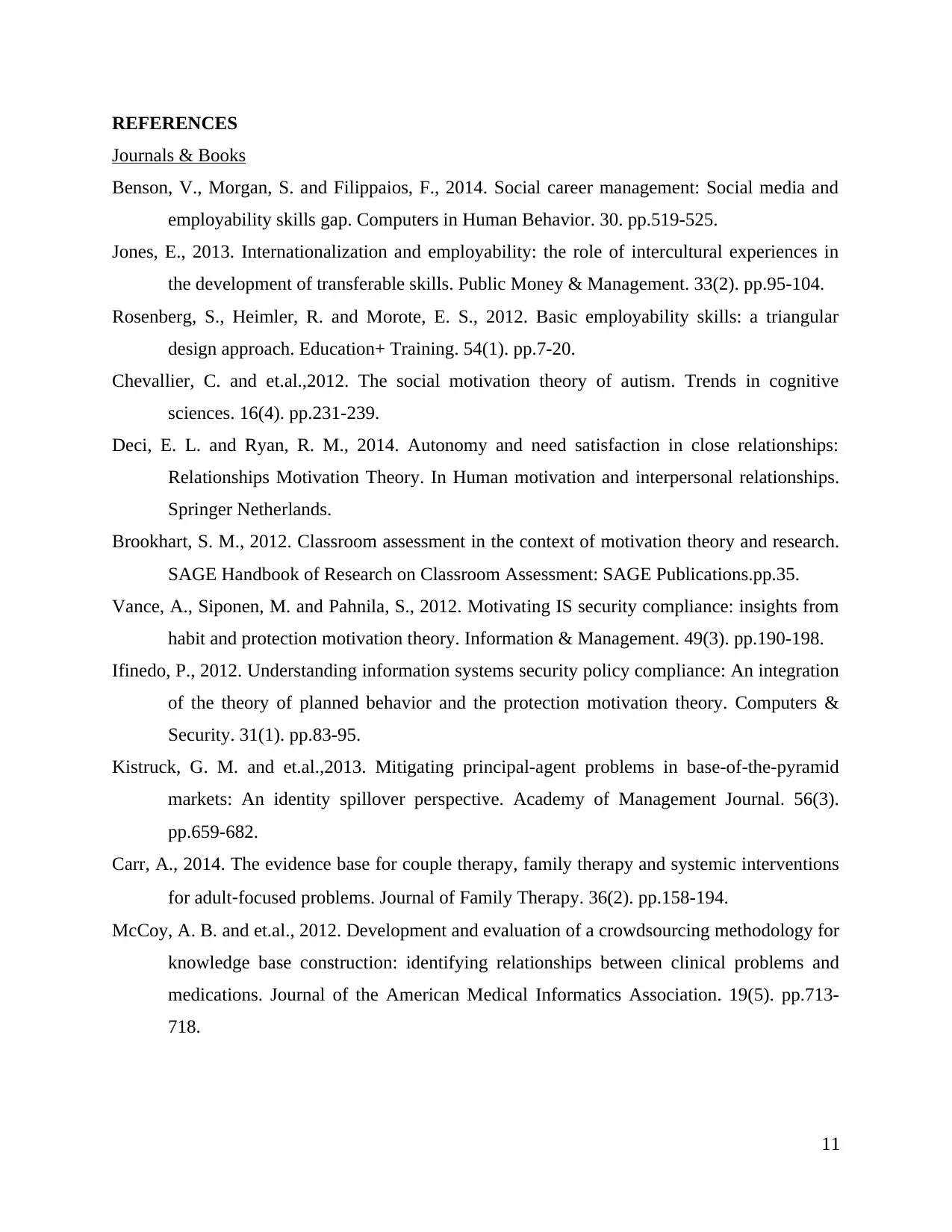
REFERENCES
Journals & Books
Benson, V., Morgan, S. and Filippaios, F., 2014. Social career management: Social media and
employability skills gap. Computers in Human Behavior. 30. pp.519-525.
Jones, E., 2013. Internationalization and employability: the role of intercultural experiences in
the development of transferable skills. Public Money & Management. 33(2). pp.95-104.
Rosenberg, S., Heimler, R. and Morote, E. S., 2012. Basic employability skills: a triangular
design approach. Education+ Training. 54(1). pp.7-20.
Chevallier, C. and et.al.,2012. The social motivation theory of autism. Trends in cognitive
sciences. 16(4). pp.231-239.
Deci, E. L. and Ryan, R. M., 2014. Autonomy and need satisfaction in close relationships:
Relationships Motivation Theory. In Human motivation and interpersonal relationships.
Springer Netherlands.
Brookhart, S. M., 2012. Classroom assessment in the context of motivation theory and research.
SAGE Handbook of Research on Classroom Assessment: SAGE Publications.pp.35.
Vance, A., Siponen, M. and Pahnila, S., 2012. Motivating IS security compliance: insights from
habit and protection motivation theory. Information & Management. 49(3). pp.190-198.
Ifinedo, P., 2012. Understanding information systems security policy compliance: An integration
of the theory of planned behavior and the protection motivation theory. Computers &
Security. 31(1). pp.83-95.
Kistruck, G. M. and et.al.,2013. Mitigating principal-agent problems in base-of-the-pyramid
markets: An identity spillover perspective. Academy of Management Journal. 56(3).
pp.659-682.
Carr, A., 2014. The evidence base for couple therapy, family therapy and systemic interventions
for adult‐focused problems. Journal of Family Therapy. 36(2). pp.158-194.
McCoy, A. B. and et.al., 2012. Development and evaluation of a crowdsourcing methodology for
knowledge base construction: identifying relationships between clinical problems and
medications. Journal of the American Medical Informatics Association. 19(5). pp.713-
718.
11
Journals & Books
Benson, V., Morgan, S. and Filippaios, F., 2014. Social career management: Social media and
employability skills gap. Computers in Human Behavior. 30. pp.519-525.
Jones, E., 2013. Internationalization and employability: the role of intercultural experiences in
the development of transferable skills. Public Money & Management. 33(2). pp.95-104.
Rosenberg, S., Heimler, R. and Morote, E. S., 2012. Basic employability skills: a triangular
design approach. Education+ Training. 54(1). pp.7-20.
Chevallier, C. and et.al.,2012. The social motivation theory of autism. Trends in cognitive
sciences. 16(4). pp.231-239.
Deci, E. L. and Ryan, R. M., 2014. Autonomy and need satisfaction in close relationships:
Relationships Motivation Theory. In Human motivation and interpersonal relationships.
Springer Netherlands.
Brookhart, S. M., 2012. Classroom assessment in the context of motivation theory and research.
SAGE Handbook of Research on Classroom Assessment: SAGE Publications.pp.35.
Vance, A., Siponen, M. and Pahnila, S., 2012. Motivating IS security compliance: insights from
habit and protection motivation theory. Information & Management. 49(3). pp.190-198.
Ifinedo, P., 2012. Understanding information systems security policy compliance: An integration
of the theory of planned behavior and the protection motivation theory. Computers &
Security. 31(1). pp.83-95.
Kistruck, G. M. and et.al.,2013. Mitigating principal-agent problems in base-of-the-pyramid
markets: An identity spillover perspective. Academy of Management Journal. 56(3).
pp.659-682.
Carr, A., 2014. The evidence base for couple therapy, family therapy and systemic interventions
for adult‐focused problems. Journal of Family Therapy. 36(2). pp.158-194.
McCoy, A. B. and et.al., 2012. Development and evaluation of a crowdsourcing methodology for
knowledge base construction: identifying relationships between clinical problems and
medications. Journal of the American Medical Informatics Association. 19(5). pp.713-
718.
11
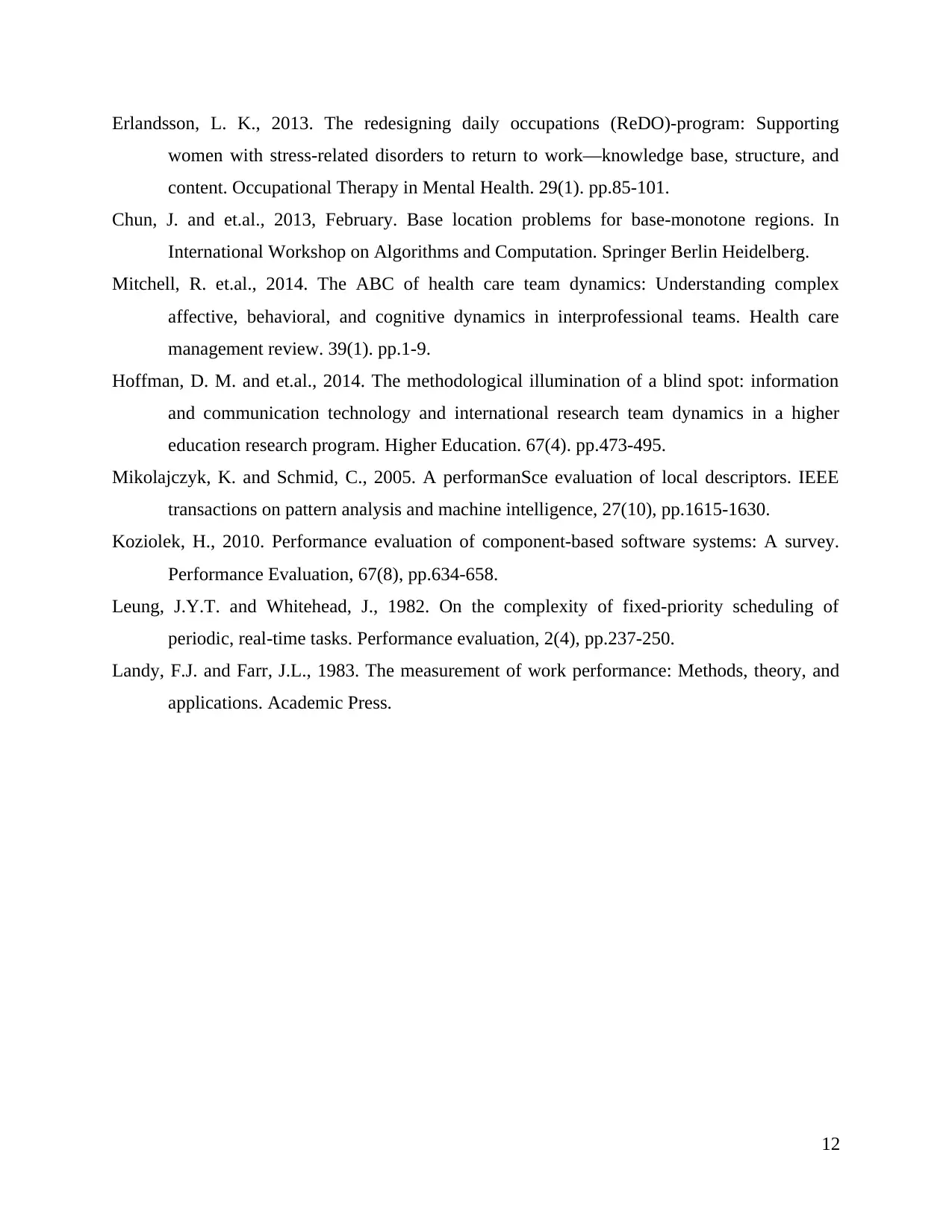
Erlandsson, L. K., 2013. The redesigning daily occupations (ReDO)-program: Supporting
women with stress-related disorders to return to work—knowledge base, structure, and
content. Occupational Therapy in Mental Health. 29(1). pp.85-101.
Chun, J. and et.al., 2013, February. Base location problems for base-monotone regions. In
International Workshop on Algorithms and Computation. Springer Berlin Heidelberg.
Mitchell, R. et.al., 2014. The ABC of health care team dynamics: Understanding complex
affective, behavioral, and cognitive dynamics in interprofessional teams. Health care
management review. 39(1). pp.1-9.
Hoffman, D. M. and et.al., 2014. The methodological illumination of a blind spot: information
and communication technology and international research team dynamics in a higher
education research program. Higher Education. 67(4). pp.473-495.
Mikolajczyk, K. and Schmid, C., 2005. A performanSce evaluation of local descriptors. IEEE
transactions on pattern analysis and machine intelligence, 27(10), pp.1615-1630.
Koziolek, H., 2010. Performance evaluation of component-based software systems: A survey.
Performance Evaluation, 67(8), pp.634-658.
Leung, J.Y.T. and Whitehead, J., 1982. On the complexity of fixed-priority scheduling of
periodic, real-time tasks. Performance evaluation, 2(4), pp.237-250.
Landy, F.J. and Farr, J.L., 1983. The measurement of work performance: Methods, theory, and
applications. Academic Press.
12
women with stress-related disorders to return to work—knowledge base, structure, and
content. Occupational Therapy in Mental Health. 29(1). pp.85-101.
Chun, J. and et.al., 2013, February. Base location problems for base-monotone regions. In
International Workshop on Algorithms and Computation. Springer Berlin Heidelberg.
Mitchell, R. et.al., 2014. The ABC of health care team dynamics: Understanding complex
affective, behavioral, and cognitive dynamics in interprofessional teams. Health care
management review. 39(1). pp.1-9.
Hoffman, D. M. and et.al., 2014. The methodological illumination of a blind spot: information
and communication technology and international research team dynamics in a higher
education research program. Higher Education. 67(4). pp.473-495.
Mikolajczyk, K. and Schmid, C., 2005. A performanSce evaluation of local descriptors. IEEE
transactions on pattern analysis and machine intelligence, 27(10), pp.1615-1630.
Koziolek, H., 2010. Performance evaluation of component-based software systems: A survey.
Performance Evaluation, 67(8), pp.634-658.
Leung, J.Y.T. and Whitehead, J., 1982. On the complexity of fixed-priority scheduling of
periodic, real-time tasks. Performance evaluation, 2(4), pp.237-250.
Landy, F.J. and Farr, J.L., 1983. The measurement of work performance: Methods, theory, and
applications. Academic Press.
12
⊘ This is a preview!⊘
Do you want full access?
Subscribe today to unlock all pages.

Trusted by 1+ million students worldwide
1 out of 13
Related Documents
Your All-in-One AI-Powered Toolkit for Academic Success.
+13062052269
info@desklib.com
Available 24*7 on WhatsApp / Email
![[object Object]](/_next/static/media/star-bottom.7253800d.svg)
Unlock your academic potential
Copyright © 2020–2026 A2Z Services. All Rights Reserved. Developed and managed by ZUCOL.





